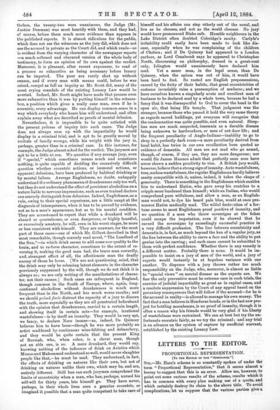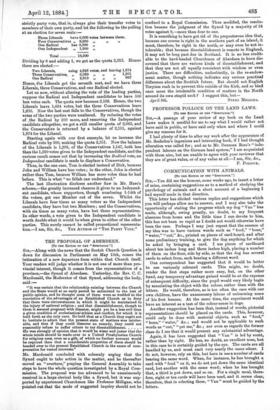LETTERS TO THE EDITOR.
PROPORTIONAL REPRESENTATION.
(To THE EDITOR OF TBZ " SPBOTATOR.1
Sus,—Mr. Hare's scheme is so constantly spoken of under the' term "Proportional Representation," that it seems almost a heresy to suggest that this is an error. Allow me, however, to point out some curious results of the scheme, results which it has in common with every plan making use of a quota, and. which certainly destroy its claim to the above title. To avoid complications, let us suppose that the various parties give .a strictly party vote, that is, always give their transfer votes to members of their own party, and let the following be the polling at an election for seven seats :—
Three Liberals have 6,000 votes between them.
Four Conservatives „ 8,200 One Radical has 3,000 One Independent „ 1,300 Total 18,500
Dividing by 8 and adding 1, we get as the quota 2,313. Hence/ there are elected :-
Two Liberals, using 4,626 votes, and leaving 1,374
Three Conservatives, „ 6,930 „ „ „ 1,261 One Radical „ 2,313 „ „ 687
Hence, the Liberals get the seventh seat, and we have three Liberals, three Conservatives, and one Radical elected.
Let us now, without altering the vote of the leading parties, suppose the Radical and Independent candidates to have 500 less votes each. The quota now becomes 2188. Hence, the two Liberals leave 1,624 votes, but the three Conservatives leave 1,636. Now the last seat falls to the Conservatives, though the votes of the two parties were unaltered. By reducing the votes of the Radical by 200 more, and removing the Independent candidate altogether, we get a still smaller quota of 2,063, and the Conservative is returned by a balance of 2,111, against 1,874 for the Liberal.
Starting again with our first example, let us increase the Radical vote by 300, making the quota 2,351. Now the balance of the Liberals is 1,298, of the Conservatives 1,147, both less than the 1,300 votes given to the Independent candidate, and the curious result comes out that by increasing the Radical vote, an Independent candidate is made to displace a Conservative.
Thus, in the one case, Tom is elected instead of Dick, because John and William have less votes ; in the other, John is elected rather than Tom, because William has more votes than he had before. This is what "no fellah can understand."
The last illustration discloses another flaw in Mr. Hare's scheme,—the greatly increased chances it gives to an Independ- ent candidate, whose supporters, though numbering 1-14th of
the voters, get one Member out of the seven. Whilst the Liberals have four times as many voters as the Independent candidate, they have but two Members ; and the Conservatives, with six times as many votes, have but three representatives. In other words, a vote given to the Independent candidate is worth double what it would be when given to either of the other -parties. This surely cannot be called proportional representa- tion.—I am, Sir, &C., THE AUTHOR OP "THE PARTY VOTE."



































 Previous page
Previous page